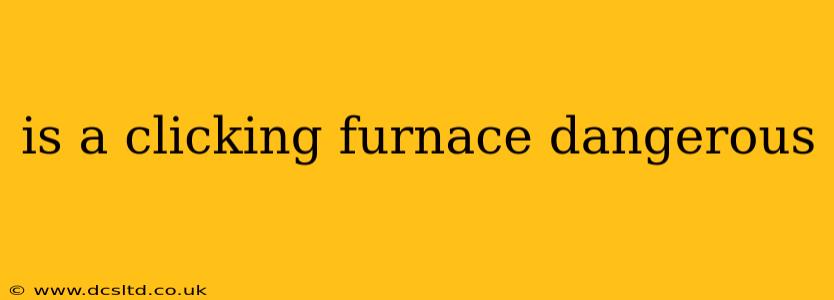A clicking sound emanating from your furnace can be unsettling. While sometimes it's a minor issue, other times it could signal a serious problem requiring immediate attention. This comprehensive guide will help you understand the potential dangers of a clicking furnace and what steps to take.
What Causes a Clicking Sound in a Furnace?
Several things can cause a clicking sound in your furnace. Understanding the source is key to determining the level of danger. Common culprits include:
- Gas valve issues: A clicking sound that's repetitive and accompanied by a failure to ignite could indicate a problem with the gas valve. This is a serious issue as it could lead to gas leaks, potentially causing explosions or carbon monoxide poisoning.
- Igniter problems: The igniter is responsible for lighting the burner. A clicking sound without ignition usually points to a malfunctioning igniter, which needs replacement. While not an immediate safety hazard like a gas leak, a faulty igniter renders your furnace useless.
- Electrical problems: Clicking sounds might stem from loose wiring, faulty electrical components, or a failing blower motor. While these aren't inherently as dangerous as gas leaks, they could lead to electrical fires or complete system failure.
- Blower motor issues: A clicking sound from the blower motor often indicates a mechanical problem, such as worn bearings or a failing capacitor. This could lead to the blower motor failing entirely, preventing proper air circulation.
- Expansion and contraction: In some cases, the clicking noise is simply the sound of metal parts expanding and contracting due to temperature changes. This is usually harmless.
Is a Clicking Furnace Always Dangerous?
No, a clicking furnace isn't always dangerous. As explained above, some clicks are benign, simply the result of normal operation or minor, easily-remedied issues. However, a clicking sound accompanied by other symptoms should be treated as a potential danger sign.
What are the Danger Signs to Watch Out For?
Beyond the clicking sound itself, these are red flags indicating a potentially dangerous situation:
- Smell of gas: A strong gas odor is a serious safety hazard. Immediately evacuate your home and call your gas company.
- Failure to ignite: If the furnace clicks repeatedly but doesn't start, it might indicate a gas leak or other serious malfunction.
- Unusual smoke or flames: Smoke or flames coming from your furnace are clear indications of a dangerous situation. Turn off the furnace immediately and evacuate.
- Tripped breaker: A constantly tripping circuit breaker might indicate an electrical fault.
- Unusual noises: In addition to clicking, unusual banging, rattling, or other loud sounds are also cause for concern.
What Should I Do If My Furnace is Clicking?
Your course of action depends on the specific circumstances.
- For minor clicking, without other concerning symptoms: Observe the situation. If the clicking stops and the furnace operates normally, the issue may be minor and resolve itself. However, it's still a good idea to schedule a professional inspection.
- For persistent clicking, or clicking accompanied by other worrisome symptoms: Turn off your furnace immediately. Do not attempt to repair it yourself unless you're a qualified HVAC technician. Call a qualified HVAC professional to diagnose and repair the problem.
How Can I Prevent Furnace Problems?
Regular maintenance significantly reduces the risk of dangerous malfunctions. Schedule annual inspections and cleaning by a qualified HVAC technician. This can often catch minor problems before they escalate into serious issues.
Should I call a professional immediately if my furnace is clicking?
While not every clicking sound warrants an immediate call, it's best to err on the side of caution. If the clicking is persistent, accompanied by other unusual noises, smells, or failure to ignite, immediately contact a qualified HVAC technician. Ignoring a potential problem could lead to far more serious (and costly) consequences.
This information is for educational purposes only and should not be considered professional HVAC advice. Always consult a qualified HVAC technician for diagnosis and repair of furnace problems.
